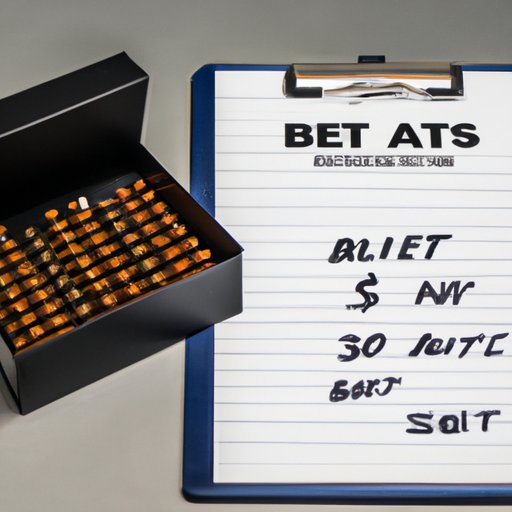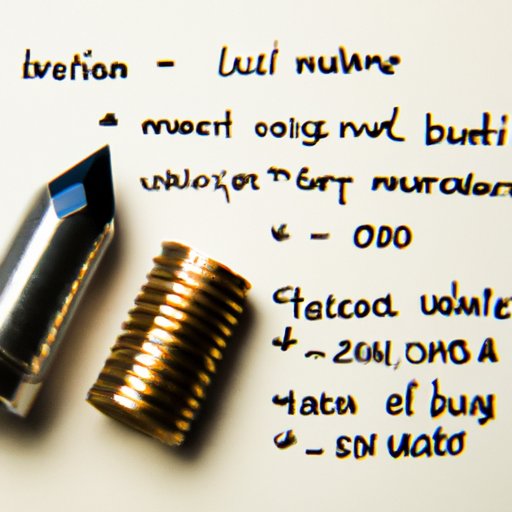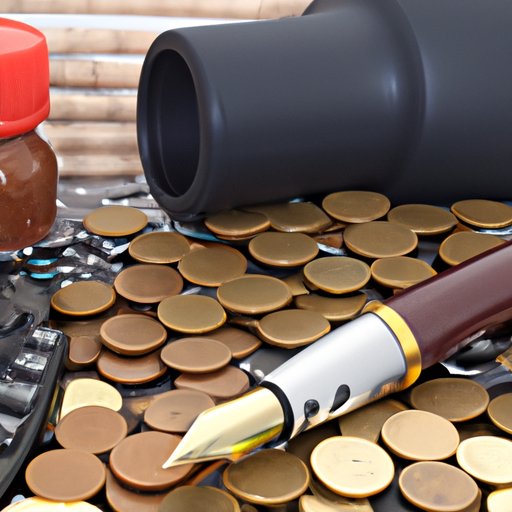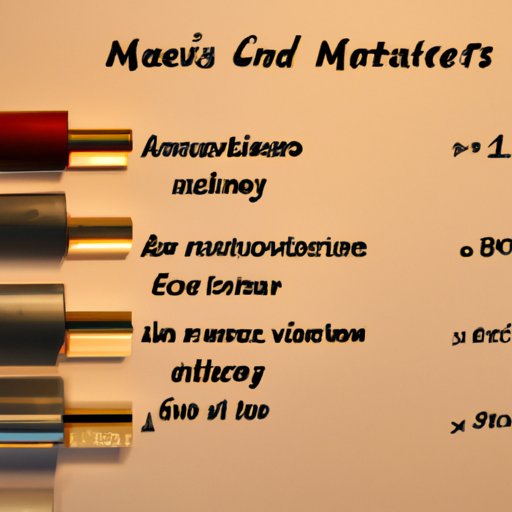Introduction
Ammunition is an essential component of any firearm. It is used to propel a projectile from the barrel of a gun, and is composed of several components, including a cartridge case, primer, propellant, and a bullet. Bullets are the part of the ammunition that actually exits the barrel of the gun and cause damage. In this article, we will explore how much does a bullet cost and investigate the differences in price between a single bullet and a box of bullets.

Comparing the Cost of a Single Bullet to a Box of Bullets
The cost of a single bullet can vary greatly depending on the type, brand, and quality of the bullet. On average, a single bullet can range anywhere from $0.05 to $1 or more. When buying a box of bullets, however, the cost per bullet typically goes down significantly. For example, a box of 50 9mm rounds may cost around $15, making the cost per bullet just $0.30. Bulk purchases of ammunition tend to be much cheaper than buying individual bullets, which is why it is often recommended to buy in bulk when possible.
When purchasing a box of bullets, there are also many different types of ammunition available. Common types of ammunition include rifle, pistol, shotgun, and specialty ammunition. Rifle and pistol ammunition are the most commonly used, and are often referred to as “centerfire” ammunition. Shotgun shells are typically referred to as “shotshell” ammunition. Specialty ammunition includes tracer, armor piercing, and frangible rounds.
Exploring Different Types of Bullets and Their Costs
When shopping for ammunition, one of the first things you need to consider is the type of bullet you need. Different types of bullets have different costs, so it is important to know what type you need before you shop. Common types of bullets include full metal jacket (FMJ), hollow point (HP), and soft point (SP). FMJ bullets are usually the cheapest, with prices ranging from $0.05 to $0.20 per round. HP and SP bullets are usually more expensive, with prices ranging from $0.25 to $1 or more per round.
Another factor to consider when buying bullets is the brand. Different brands offer different levels of quality, so it is important to research different brands and compare prices. Some of the more popular brands include Federal, Remington, Winchester, Hornady, and CCI. Prices for these brands can range from $0.10 to $1 or more per round, depending on the type and quality of the ammunition.
In addition to the more common types of ammunition, there are also specialty bullets available. These include tracer, armor piercing, and frangible rounds. Tracer bullets are designed to leave a visible trail of light behind them, while armor piercing bullets are designed to penetrate through body armor. Frangible bullets are designed to break apart upon impact and are often used for target practice. Prices for these types of bullets can range from $0.50 to $2 or more per round.
Examining the Cost of a Bullet as it Relates to Gun Prices
When it comes to firearms, the cost of the gun itself is only part of the equation. The cost of ammunition must also be taken into consideration. Generally speaking, the cost of a handgun is less than the cost of a rifle. Handguns typically range from $200 to $1,000 or more, whereas rifles can range from $500 to $2,000 or more. The cost of ammunition is usually much less than the cost of the gun itself, with prices ranging from $0.05 to $1 or more per round.
When comparing the cost of ammunition to the cost of the gun, it is important to consider the fact that used guns tend to be cheaper than new guns. Used guns may have fewer features, but they can still be used effectively and may be a good option for those on a budget. Additionally, the cost of ammunition for used guns may be lower than for new guns, since the used gun may use a less expensive type of ammunition.

Breaking Down the Cost of a Bullet by its Components
A bullet is composed of several components, each of which contributes to the overall cost. The main components of a bullet include the bullet itself, the casing, the primer, and the propellant. The bullet is the actual projectile that exits the barrel of the gun and causes damage. The casing is the container that holds the bullet and other components together. The primer is the component that ignites the propellant, which is the substance that propels the bullet out of the barrel.
The cost of each component varies depending on the type and quality of the component. Generally speaking, the cost of the bullet itself is the most expensive component, with prices ranging from $0.05 to $1 or more per round. The casing and primer are usually much cheaper, with prices ranging from $0.01 to $0.10 per round. The cost of the propellant is usually even less, with prices ranging from $0.01 to $0.05 per round.
In addition to the components mentioned above, the quality of the components can also play a role in the overall cost. Higher quality components tend to be more expensive, but they may also perform better and last longer. Lower quality components are usually cheaper, but they may not perform as well or last as long.

Analyzing the Cost of Ammunition in Relation to Other Shooting Supplies
In addition to the cost of ammunition, it is also important to consider the cost of other shooting supplies. Common shooting supplies include targets, ear protection, eye protection, cleaning supplies, and gun cases. The cost of these items can vary greatly, depending on the type and quality. Generally speaking, the cost of targets and ear/eye protection tends to be lower than the cost of ammunition, while the cost of cleaning supplies and gun cases tends to be higher.
It is also important to consider the effect that the cost of ammunition has on the cost of other shooting supplies. If the cost of ammunition increases, then the cost of other shooting supplies may also increase due to the increased demand. Additionally, if the cost of ammunition decreases, then the cost of other shooting supplies may also decrease due to the decreased demand.

Investigating the Cost of Ammunition in Different Parts of the World
The cost of ammunition can also vary greatly depending on where you are located. In some countries, ammunition can be very expensive due to import/export regulations and taxes. Additionally, in conflict zones, the cost of ammunition can be even higher due to supply and demand issues. In these areas, it is important to do your research and find out the current cost of ammunition before buying.
Discussing the Cost of Ammunition and the Effects on Law Enforcement Budgets
The cost of ammunition also has a significant effect on law enforcement budgets. Law enforcement agencies typically purchase large quantities of ammunition, which can add up quickly. As such, the cost of ammunition can have a major effect on the amount of money available for other items. To reduce costs, some law enforcement agencies have begun to look into alternative solutions, such as using non-lethal weapons or investing in technology.
Conclusion
To summarize, the cost of a bullet can vary greatly depending on the type, brand, and quality of the bullet. Bulk purchases of ammunition tend to be much cheaper than buying individual bullets, and there are many different types of ammunition available. Additionally, the cost of ammunition should be taken into consideration when purchasing a firearm, and the cost of ammunition can vary greatly depending on where you are located. Finally, the cost of ammunition can have a major effect on law enforcement budgets, so it is important for agencies to look into alternative solutions to reduce costs.
If you are looking to save money on ammunition, it is recommended to buy in bulk and to research different brands and types of ammunition to find the best deals. Additionally, it is important to consider the cost of other shooting supplies, as the cost of ammunition can affect the cost of these items. Lastly, it is important to be aware of the cost of ammunition in different parts of the world, as it can vary greatly due to import/export regulations and taxes.
(Note: Is this article not meeting your expectations? Do you have knowledge or insights to share? Unlock new opportunities and expand your reach by joining our authors team. Click Registration to join us and share your expertise with our readers.)
